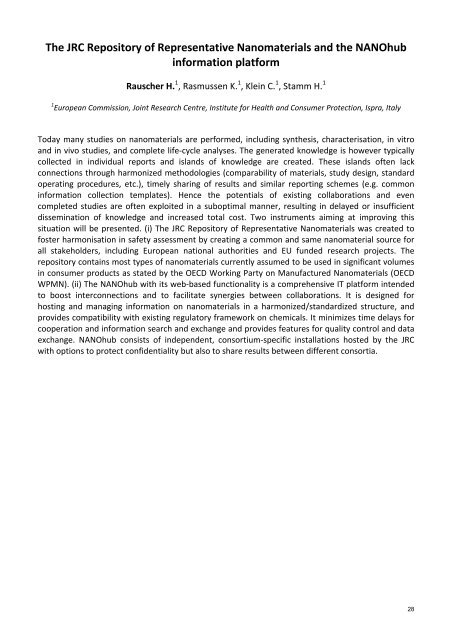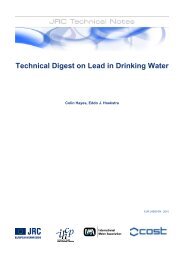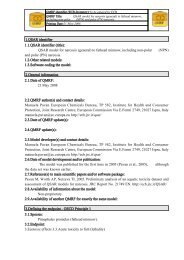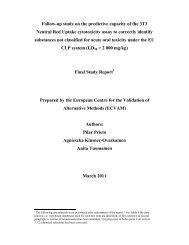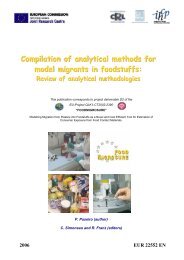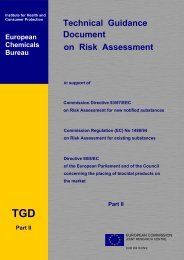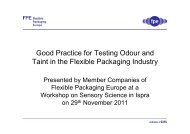Challenges of Regulation and Risk Assessment of Nanomaterials
Challenges of Regulation and Risk Assessment of Nanomaterials
Challenges of Regulation and Risk Assessment of Nanomaterials
Create successful ePaper yourself
Turn your PDF publications into a flip-book with our unique Google optimized e-Paper software.
The JRC Repository <strong>of</strong> Representative <strong>Nanomaterials</strong> <strong>and</strong> the NANOhub<br />
information platform<br />
Rauscher H. 1 , Rasmussen K. 1 , Klein C. 1 , Stamm H. 1<br />
1 European Commission, Joint Research Centre, Institute for Health <strong>and</strong> Consumer Protection, Ispra, Italy<br />
Today many studies on nanomaterials are performed, including synthesis, characterisation, in vitro<br />
<strong>and</strong> in vivo studies, <strong>and</strong> complete life-cycle analyses. The generated knowledge is however typically<br />
collected in individual reports <strong>and</strong> isl<strong>and</strong>s <strong>of</strong> knowledge are created. These isl<strong>and</strong>s <strong>of</strong>ten lack<br />
connections through harmonized methodologies (comparability <strong>of</strong> materials, study design, st<strong>and</strong>ard<br />
operating procedures, etc.), timely sharing <strong>of</strong> results <strong>and</strong> similar reporting schemes (e.g. common<br />
information collection templates). Hence the potentials <strong>of</strong> existing collaborations <strong>and</strong> even<br />
completed studies are <strong>of</strong>ten exploited in a suboptimal manner, resulting in delayed or insufficient<br />
dissemination <strong>of</strong> knowledge <strong>and</strong> increased total cost. Two instruments aiming at improving this<br />
situation will be presented. (i) The JRC Repository <strong>of</strong> Representative <strong>Nanomaterials</strong> was created to<br />
foster harmonisation in safety assessment by creating a common <strong>and</strong> same nanomaterial source for<br />
all stakeholders, including European national authorities <strong>and</strong> EU funded research projects. The<br />
repository contains most types <strong>of</strong> nanomaterials currently assumed to be used in significant volumes<br />
in consumer products as stated by the OECD Working Party on Manufactured <strong>Nanomaterials</strong> (OECD<br />
WPMN). (ii) The NANOhub with its web-based functionality is a comprehensive IT platform intended<br />
to boost interconnections <strong>and</strong> to facilitate synergies between collaborations. It is designed for<br />
hosting <strong>and</strong> managing information on nanomaterials in a harmonized/st<strong>and</strong>ardized structure, <strong>and</strong><br />
provides compatibility with existing regulatory framework on chemicals. It minimizes time delays for<br />
cooperation <strong>and</strong> information search <strong>and</strong> exchange <strong>and</strong> provides features for quality control <strong>and</strong> data<br />
exchange. NANOhub consists <strong>of</strong> independent, consortium-specific installations hosted by the JRC<br />
with options to protect confidentiality but also to share results between different consortia.<br />
28


